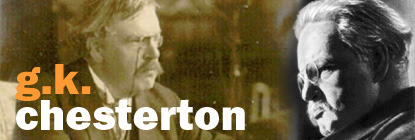"Chesterton's genius lay in the fact that he was a deeply Catholic thinker ..."
... and, more than that, a deeply Catholic man. He did not enter the Church until 1922, but he thought as a Catholic long before then. His astonishing output of books, magazine articles, poetry, mysteries, literary criticism, and plays reveals the mind, heart, and soul of what Dale Ahlquist, President of the American Chesterton Society, calls a "complete thinker". He was as at home (and as profound and funny) talking about theology as he was dealing with politics, the works of Dickens, the American Experiment, or the latest kook insisting on vegetarianism. He could, he said, find his way to a discussion of the deepest truths of the Faith beginning with anything from pork to pyrotechnics, because he deeply believed in (and was profoundly grateful for) the fact that everything in this world is a gift of a loving Creator who is also Father.
Chesterton has been called the "Laughing Prophet", and with good reason. He was one of the most consistently funny writers in English. But he is also one of the most insightful. Reading his writing from a century ago, one is struck again and again by how much of the 20th Century he foresaw – and how blind his trendier contemporaries were to the outcome of their fashionable philosophies.
Chesterton was also a profoundly humble man. He enjoyed no joke so much as one at his own expense. And he had a brilliant ability to see what is good, even in thinking and deeds of people with whom he deeply disagrees. He had the knack of being friends with a whole host of leading lights of his day, even as he carried on disputes with them in which he reduced their arguments to dust.
From Mark Shea's column, "G. K. Chesterton: An Appreciation", on Headline Bistro, written to mark the 75th anniversary of Chesterton's passing from this life to the next.
There is much that has been and can be said about Chesterton. Here is a bit from my essay, "Chesterton and the 'Paradoxy' of Orthodoxy":
My favorite passage of Chestertonian brilliance is the sixth chapter of Orthodoxy, titled "Paradoxes of Christianity." It should be required reading for all critics of Christianity, especially those self-anointed, enlightened folk who, gazing back (and down) upon two thousand years of dogmatic darkness, have figured out all that is wrong and insulting about the Church and now eagerly take up sticks with which to beat down the crude absurdities embraced by the followers of Jesus.
In that chapter the young Chesterton (just in his early thirties when he penned Orthodoxy), described his own intellectual journey from paganism to agnosticism to theism. Along the way he examined various challenges to Christianity, noting, "It was attacked on all sides and for all contradictory reasons." His observations are just as illuminating today as they were one hundred years ago—perhaps even more so—for they outline the flawed nature of the biases of skeptics and scoffers, and are therefore of no small assistance to anyone defending Christianity in today's hostile public square
Read the entire piece. For much, much more about Chesterton's life and work, see these various links on Ignatius Insight:

• Articles By and About G. K. Chesterton
• Ignatius Press Books about G. K. Chesterton
• Books by G. K. Chesterton
Carl E. Olson's Blog
- Carl E. Olson's profile
- 20 followers



